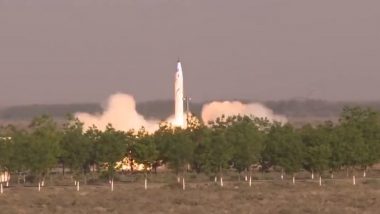OneSpace, a startup based in Beijing, on Thursday became the country's first private company to launch its own rocket. It said its 9-meter-tall OS-X rocket successfully blasted off from a base in northwestern China.
The 9-meter, 7,200-kilogram Chongqing Liangjiang Star was launched at 7:33 a.m. on Thursday from an undisclosed location in Northwest China, according to a statement the rocket’s developer, OneSpace, sent to Sixth Tone. The craft reached a peak altitude of 38.7 kilometers and a top speed of nearly 2,000 meters per second.
Five minutes after its launch, Chongqing Liangjiang Star returned to Earth, where OneSpace collected the debris for further research, the company said in its statement.
VIDEO: China's OneSpace launches the country's first private rocket pic.twitter.com/F6wvgT132g
— People's Daily,China (@PDChina) May 17, 2018
In April, another Beijing startup, i-Space, launched a rocket on the island province of Hainan. However, OneSpace is promoting its latest accomplishment as the first successful launch of a rocket carrying a payload — the weight of which it has not disclosed.
Founded in 2015, OneSpace is often likened to Elon Musk's SpaceX, a comparison that founder and CEO Shu Chang doesn't shy away from. "OneSpace's situation right now is very much like where SpaceX stood in its early years. SpaceX is the first in the US. We're the first in China," he told CNNMoney in an interview ahead of the launch.
In November 2014, the State Council, China’s cabinet, announced that it would allow private companies to build and launch satellites. And two years later, a government-issued white paper explicitly encouraged private investment in China’s previously closed space sector.
OneSpace, the Beijing-based company behind the launch, is one of dozens of Chinese rivals jostling for a slice of the global space industry, estimated to be worth about US$339 billion by Bank of America Merrill Lynch and currently dominated by SpaceX and Blue Origin in the United States.
By the end of the decade, OneSpace expects to build 20 of the OS-X rockets, capable of placing a 100-kilogram payload into an orbit 800km from the Earth’s surface, the company said. The firm is also developing the M-series rocket to compete in the growing microsatellite sector.
Microsatellites are cheaper to build and easier to deploy than traditional truck-sized versions, and their launch has become an increasingly lucrative market, currently dominated by the Indian space program.
(The above story first appeared on LatestLY on May 18, 2018 04:16 AM IST. For more news and updates on politics, world, sports, entertainment and lifestyle, log on to our website latestly.com).













 Quickly
Quickly


